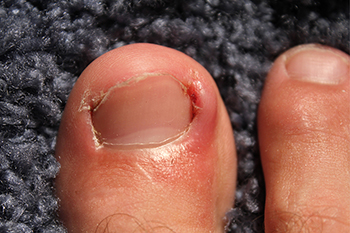1648 US Highway 130
North Brunswick, NJ 08902

Ingrown toenails can be a painful and persistent issue, usually affecting the big toe and causing discomfort, inflammation, and sometimes bleeding. An ingrown toenail often results from wearing tight shoes, foot injuries, genetics, or poor foot care. When the curved edges of the nail pierce into the surrounding skin, pressure builds up, leading to pain, inflammation, tenderness, and redness. Beyond conservative treatments, there are two primary surgical methods for treatment, which are referred to as partial nail avulsion and total nail avulsion. Both are conducted under local anesthesia. Partial nail avulsion involves removing a portion of the nail, known as a wedge resection. The procedure trims one or both edges of the nail to make it narrower and give it a straight edge. This ingrown toenail treatment takes approximately 30 minutes and has a high success rate. With total nail avulsion, the entire nail is removed. This procedure is often reserved for those with recurrent issues or who are unresponsive to other less invasive ingrown toenail treatments. Proactive toenail care and early intervention are key to addressing ingrown toenails effectively. To manage an exceedingly painful or infected ingrown toenail, it is suggested that you make an appointment with a podiatrist for an exam, in addition to determining if surgery is best for you.
Ingrown toenails can become painful if they are not treated properly. For more information about ingrown toenails, contact Dr. Robert Fink of Brunswick Foot & Ankle Group. Our doctor can provide the care you need to keep you pain-free and on your feet.
Ingrown Toenails
Ingrown toenails occur when a toenail grows sideways into the bed of the nail, causing pain, swelling, and possibly infection.
Causes
Prevention
Because ingrown toenails are not something found outside of shoe-wearing cultures, going barefoot as often as possible will decrease the likeliness of developing ingrown toenails. Wearing proper fitting shoes and using proper cutting techniques will also help decrease your risk of developing ingrown toenails.
Treatment
Ingrown toenails are a very treatable foot condition. In minor cases, soaking the affected area in salt or antibacterial soaps will not only help with the ingrown nail itself, but also help prevent any infections from occurring. In more severe cases, surgery is an option. In either case, speaking to your podiatrist about this condition will help you get a better understanding of specific treatment options that are right for you.
If you have any questions please feel free to contact our office located in North Brunswick, NJ . We offer the newest diagnostic and treatment technologies for all your foot and ankle needs.